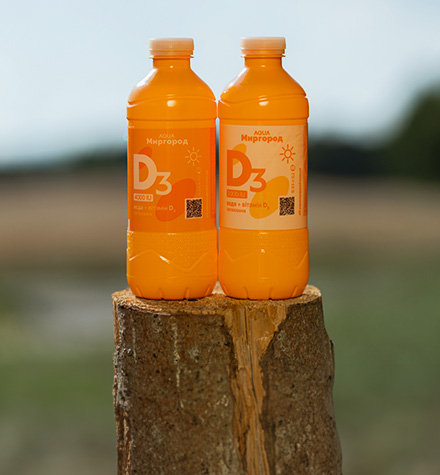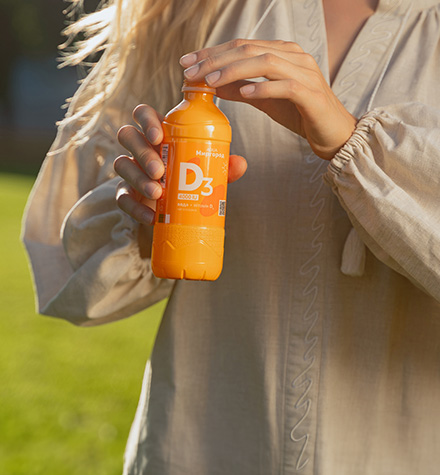Vitamin D3 is one of the key elements necessary for human health. Aqua Myrgorod D3 is a unique water with the addition of this vitamin, which helps to maintain the balance of substances in your body.
What is vitamin D3?
Vitamin D3 or cholecalciferol is a fat-soluble vitamin synthesized in the skin under the influence of ultraviolet rays. It plays an important role in many body processes:
- Strengthening bones and teeth. D3 promotes the absorption of calcium and phosphorus, which are essential for a healthy bone system.
- Support of the immune system. The vitamin helps the body fight viruses and bacteria, and reduces the risk of inflammation.
- Improves mood. D3 affects the production of serotonin, the hormone of happiness.
- Strengthens the walls of blood vessels and muscles. Increases muscle tone and provides muscles with efficient metabolic metabolism, promoting their growth and development
Insufficient levels of vitamin D3 can lead to fatigue, weakness, bone deterioration and reduced immunity.
How to use Aqua Myrgorod D3?
To get the most out of Aqua Myrgorod D3, follow these simple recommendations.
- It is recommended to consume the bottle within a day after opening.
- Recommended for use during training.
- It is recommended to use the normal dose, because Aqua Myrgorod D3 has a better absorption compared to the tablet form.
To get the most out of Aqua Myrgorod D3, follow these simple recommendations:
- Daily allowance. Of course, there are general recommended consumption rates. Aqua Myrgorod D3 has several dosage options: 2000 and 4000. However, the level of vitamin in the body is individual and depends on a number of factors, such as climate, region of residence, diet, etc. Therefore, we recommend consulting a doctor to determine the daily dose of vitamin D3 intake.
- Time of consumption. Vitamin D3 can be consumed before, during, and after meals; its absorption is not affected by food intake. However, it is recommended to consume water in the morning or afternoon, as it reduces the synthesis of melatonin, the “sleep hormone”.
- Regularity. Constant consumption of Aqua Myrgorod D3 will help maintain a stable level of the vitamin in the body.
Aqua Myrgorod D3 - what is the secret?
Aqua Myrgorod D3 is the water enriched with vitamin D3. Its main advantage is a unique composition that makes the use of vitamin D3 as convenient and effective as possible.
- Balance. Aqua Myrgorod D3 contains the optimal amount of vitamin to meet the daily requirement without the risk of overdose. In addition, the water is enriched with auxiliary minerals that are necessary for the absorption of vitamin D3 (ml/l): iodine (<0.020), calcium (<50), magnesium (<25), sodium (<200), potassium (<10) and fluorides (<1.2).
- Better absorption. In the form of water, the vitamin begins to be absorbed, starting in the mouth, in the intestines and in the stomach. This is the difference in absorption efficiency between the tablet and water forms.
- Convenience. Aqua Myrgorod D3 is an ideal solution for people who want to provide their body with vitamins even on busy days. The 0.33-liter bottle is extremely convenient and fits even in a small bag.
- There are no contraindications for use with medicines. That is, water can be used to wash down medications, because it is an immunomodulatory vitamin, up to 80% of which is synthesized by sunlight.
- It is suitable for use by all population groups. Aqua Myrgorod D3 can be consumed by adults and the elderly, as well as by pregnant women and children. The only recommendation is to consult a doctor about the daily dose.
Other sources of vitamin D3
Why is it recommended to take vitamin D3 after a doctor's check-up? It's simple: although each of us has a vitamin deficiency, and it increases even more in winter, you need to know your recommended daily dose. So, besides Aqua Myrgorod D3, you can get this important vitamin from other sources:
- Sunlight. Walking in the sun promotes the natural synthesis of vitamin D3 in the skin.
- Food products. D3-enriched fish oil, fatty fish (salmon, mackerel), eggs, liver.
- Supplements. In case of serious deficiency, your doctor may recommend special vitamin complexes.
Remember that excessive intake of vitamin D3 can also have negative consequences, so it is important to adhere to the recommended norms.
Conclusion
Aqua Myrgorod D3 is an easy and affordable way to maintain optimal levels of vitamin D3 in your body. This unique water combines the benefits of minerals and vitamin D3 to help you stay healthy, active and energetic. Choose Aqua Myrgorod D3 and let your life be filled with health and joy!














